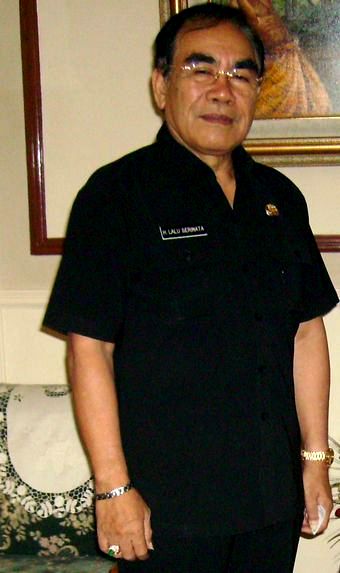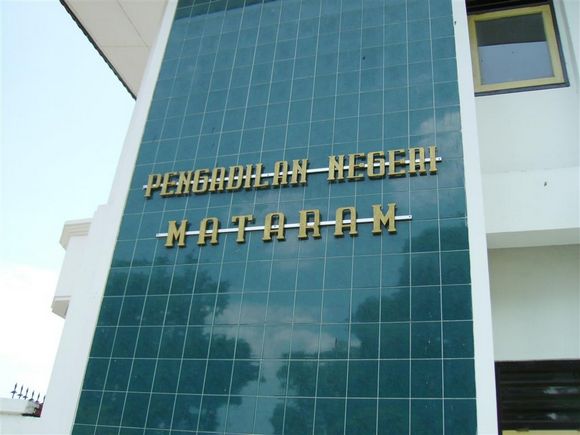Draft legislation is a prescription potentially worse than the ailment
Jeremy Kingsley
The Mataram Court where the trial is set to take placeJeremy Kingsley |
In 2006, the Indonesian Constitutional Court found sections of current anti-corruption legislation to be unconstitutional. As a result of this decision, at least crucial parts of the existing law will become invalid on 19 December 2009. The Anti-Corruption Court will disappear. This impending deadline provides Indonesian legislators with the opportunity not only to ensure the continuation of anti-corruption law, but also to improve it. But the legislation proposed so far would reduce prosecutorial capacity and weaken anti-corruption institutions rather than strengthen them.
When considering what reform is necessary, legislators need to evaluate the current laws and institutional frameworks. An important part of these frameworks are organisations like the Corruption Eradication Commission (KPK), which has become central to anti-corruption activities in recent years. KPK prosecutors have chased down members of the Indonesian Electoral Commission (KPU) who improperly used departmental funds in their preparations for the 2004 national elections. They have also held politicians from Aceh to Papua accountable for misuse of their positions, including Al Amien Nur Nasution, a former member of the national parliament who was imprisoned for eight years on bribery charges.
The current draft legislation incorporates neither support for effective anti-corruption measures nor legal protection for an accused corrupter. These limitations pose serious risks both to the future of campaigns against corruption in Indonesia and to publicly elected officials.
The trial of Haji Lalu Serinata
 |
The former governor of NTB, now awaiting trialJeremy Kingsley |
On 28 October 2008, Haji Lalu Serinata, the former governor of Nusa Tenggara Barat (NTB), emerged from a police van in handcuffs to appear at the Mataram District Court, charged with corruption. The prosecution has alleged that Serinata illegally appropriated up to Rp.23 billion (just over A$3 million) during his time as chair of the provincial legislature in 2002-2003, to assist with his election campaign.
Although this case is still only at initial procedural stages, the Attorney-General’s department in Mataram have sought to have it taken over by KPK prosecutors (approval has not yet been received). They claim that the case is just too difficult and they lack the capacity to handle it. Local prosecutors were unable to complete their investigations because they lacked the investigative skills of the KPK prosecutors, such as forensic accounting techniques needed to trace the money that Serinata allegedly misappropriated.
In the meantime however, six months have passed since Serinata was first detained. Since then, he has been imprisoned. For several weeks of this, he was hospitalised after engaging in a hunger strike and because of ill health caused by the stress of the case.
Anti-corruption cases need to be managed with integrity and rigour, something that KPK has arguably been able to do. At best then, given the haste in bringing charges and lengthy detention prior to completion of an investigation, this prosecution will have been seriously premature. But even if the KPK takes over, there is still a possibility that Serinata will be hung out to dry. If his case does become a show trial, would-be corrupters might be scared off in the short term, but in the longer term public faith in democratic institutions could be undermined, with people believing that alleged corrupters such as Serinata were only prosecuted after they lost political office.
Interpreting success
On paper, the KPK has an outstanding record – in fact, 100 per cent rate of success. This is much higher than that of the Crown Prosecution Service in the United Kingdom, which has a success rate of around 77 per cent in ‘normal’ criminal cases and 92 per cent in terrorism-related matters. But how has this success rate come about, and what does it really mean?
Local prosecutors were unable to complete their investigations because they lacked the investigative skills of the KPK prosecutors
There are three major reasons that the KPK has become an efficient prosecutorial agency. Not only has the KPK introduced better pay and conditions than the normal Indonesian public service, but KPK staff have access to the training and education needed to refine their professional skills. In addition, KPK personnel have access to state-of-the-art technology, such as surveillance equipment, to undertake investigations. Finally, KPK staff themselves are monitored and investigated to ensure their personal integrity. In part, the KPK’s success also reflects legislative restrictions placed on its prosecutors, who are not allowed to plea bargain or use prosecutorial discretion to withdraw charges. These constraints limit the temptation to succumb to corrupt advances from defendants seeking a reduction or withdrawal of charges, and ensure that KPK prosecutors only initiate cases backed by solid evidence.
On the other hand there are less flattering explanations for the KPK’s success. Many defence lawyers in Jakarta suggest that the rights of defendants are seriously compromised by the way the KPK operates because defendants are assumed to be guilty as soon as an allegation of corruption is made. There is also a perception that the judiciary is scared to reject even poor prosecution arguments and evidence in corruption cases out of fear that they themselves could be accused of being corrupt. Some also argue that the KPK owes its high success rate to the fact that it has targeted only weakened or minor political figures – a claim that appears contentious given that the KPK has prosecuted a member of the president’s extended family, members of parliament, Bank Indonesia officials and officials of the KPU.
Even if such criticisms prove to be unsubstantiated, they raise a vital question: what happens when the KPK starts to lose cases or hits a political raw nerve? Will its institutional credibility and support remain strong? To ensure long-term support for the KPK, drafters of the new legislation need to include guaranteed funding and mechanisms, such as an ombudsman, to ensure its institutional independence. The fact that formal proceedings against Serinata commenced prematurely, and possibly only because he lost political office, suggests that there also needs to be checks on the Attorney General’s department and KPK. Without them, Indonesia runs the risk of a return to practices commonly associated with the authoritarianism of the pre-reformasi period, such as predetermined court outcomes.
A dodgy draft
In order to achieve this balance, new legislation needs careful deliberation, consultation and drafting to ensure Indonesia’s anti-corruption measures are not only comprehensive but also protect defendants’ rights. But the draft bill currently before the parliament has sat on the shelf since last August without much public comment or legislative debate. And as it currently stands, it would do more harm than good.
Under further legislation still being drafted, corruption cases must be litigated using the Indonesian Criminal Code. The Criminal Code requires the national police to investigate matters. This would mean, in effect, that the KPK could no longer investigate corruption allegations. The proposed changes to arrangements for prosecuting corruption cases are also problematic. Currently, both the KPK and Attorney-General’s department can prosecute corruption cases. But the draft bill authorises the KPK to undertake only investigations, not prosecutions – a change that would drastically weaken the current system given the limitations of the Attorney-General’s department. When combined, these two provisions would essentially remove the KPK from anti-corruption activities. Considering its success to date, this would be a regrettable outcome.
This bill can no longer slip under the radar
A third major problem with the draft legislation is that it does not protect defendants’ rights. One option for legislators could be to appoint an ombudsman to oversee anti-corruption investigations and prosecutions. This would provide avenues for complaint by an aggrieved defendant or non-government organisation. Unfortunately, this kind of provision is not included in the current draft legislation.
Time for action
Will the new batch of Indonesian legislators beat the clock, or will anti-corruption strategies simply lapse? The latter is unthinkable in a democratic Indonesia, not just because political impunity would return, but because public confidence in the new democratic institutions and political leadership would be seriously damaged.
So whatever the form and substance of the revised anti-corruption legislation, one thing is for sure: this bill can no longer slip under the radar. December 19 isn’t far away. And a dodgy draft bill sitting on the shelf just isn’t enough to keep the KPK on centre stage in the struggle against corruption while protecting defendants’ rights. ii
Jeremy Kingsley (j.kingsley@unimelb.edu.au) is an ARC Federation Fellowship Doctoral Scholar and Endeavour Australia Cheung Kong Fellow at the Asian Law Centre, Melbourne Law School.











